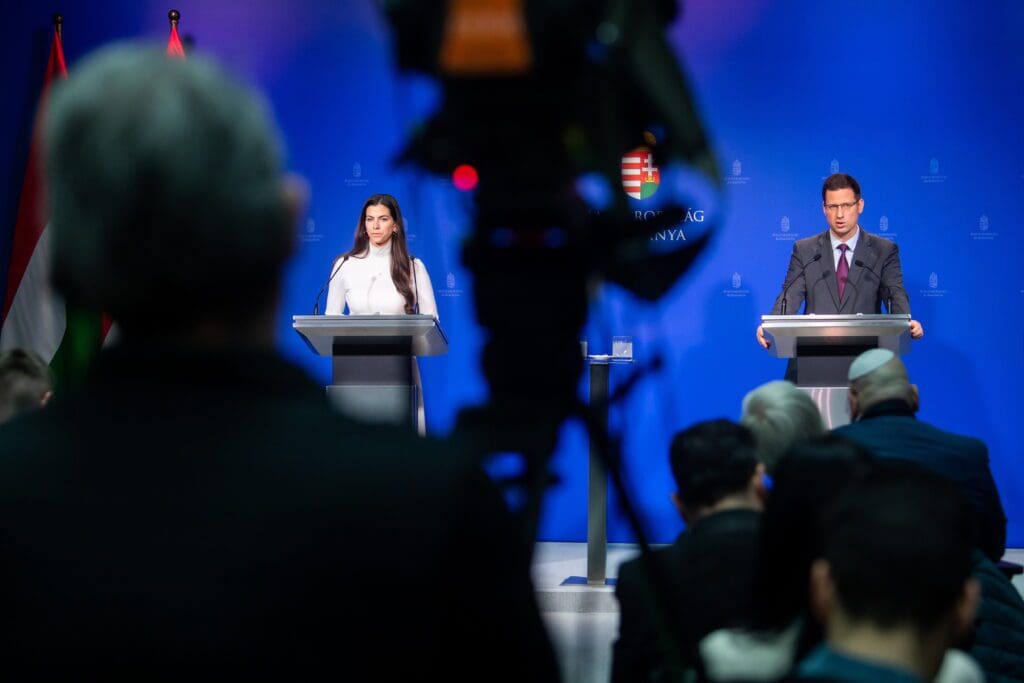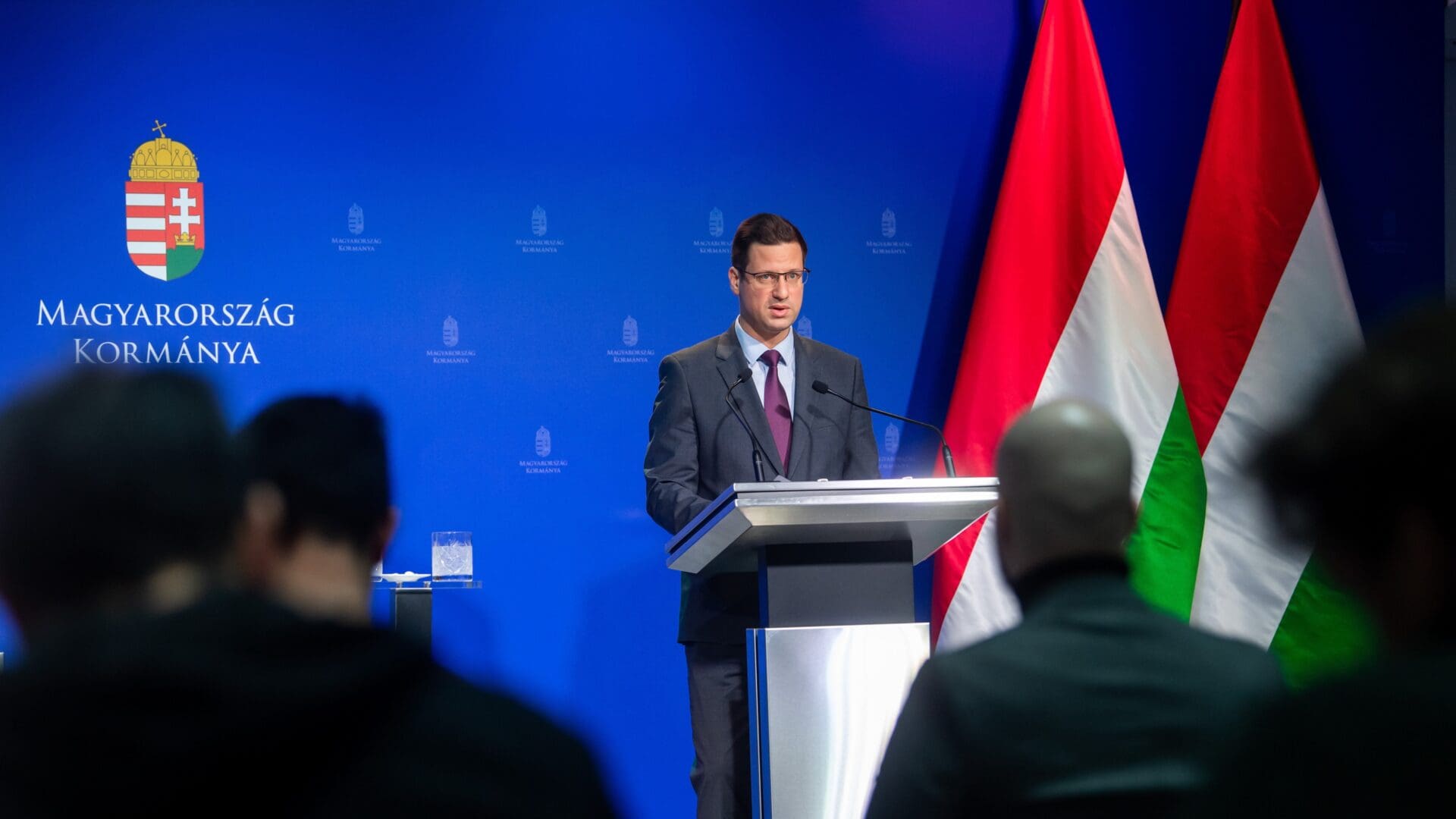According to Chief of the Prime Minister’s Office Gergely Gulyás, there are sufficient resources at the government’s disposal to ensure that the reduced fees for households with average consumption remain in place. At his regular press brief held on Thursday, 6 April, the minister welcomed the parliamentary resolution on the Russian-Ukrainian conflict adopted by the National Assembly last week.
Questions on Energy
The minister highlighted that, after reviewing the energy situation at the government’s meeting on Wednesday, it was determined that all necessary resources are available to maintain the reduction of utility bills for households up to the average consumption. Thus, everyone can count on there being no changes in the subsidised household energy regime until the end of the year, but also beyond, if possible. He emphasised that the increased energy prices pose a serious challenge to the economy, causing significant losses in terms of competitiveness and industrial performance.
He also stated that companies, local governments, churches, and foundations that have not signed contracts with the service provider, MVM, by 31 December 2022, will automatically fall under the category corresponding to the prices in force at that time. The government will intervene in the contracts and allow for new contracts to be created at the current market price. This will assist about 14,000 clients, such as companies, local governments, and churches, bringing them significant price reductions, at a loss of 19-20 billion forints for the service provider, MVM, which will absorb this loss.
Ceasefire And Peace Are The Priority
Gergely Gulyás also expressed the government’s approval of the parliamentary resolution on the Russian-Ukrainian conflict adopted by the National Assembly last week. He added that the most important thing is to achieve a ceasefire, negotiations, and peace as soon as possible, as this is the only way to save lives. He emphasised that Hungary continues to stand clearly on the side of peace in matters of war and peace, but it became apparent during the parliamentary adoption of the resolution that not everyone in Hungarian political life shares this view.
He added that the results of the election one year ago were interpreted as meaning that the majority of Hungarian voters also support peace. He stated that the resolution condemns Ukraine’s military aggression and emphasises the importance of humanitarian actions, in which Hungary has played a significant role over the past year.
He called it an example of cooperation between government and civil organizations aimed at receiving all those who flee from Ukraine, as Hungary is the first safe country.
Renovation Of Water Supply
He also reported that the government authorised Csaba Lantos, Minister of Energy, to propose the renovation of the country’s water supply system, and where possible, the establishment of a unified pricing system for water utilities. Gergely Gulyás recalled that due to current energy prices, local governments were allowed to transfer water utilities to the state. He stated that the government discussed the situation of water utilities at their Wednesday meeting and determined that the renovation of the pipeline system is ‘essential’ because the national water loss rate is 22 per cent, but in some areas, 60 per cent of water flows out before reaching consumers. He pointed out that this is the only area where maximum prices were set when reducing utility costs, resulting in significant price differences between different parts of the country.
Control Raid On Stores
Alexandra Szentkirályi, government spokesperson, reported that during the price control raid held between 23 and 29 January, consumer protection officials launched 334 proceedings, with violations identified in 179 cases and fines totalling HUF 333.3 million imposed. On average, two to three violations occurred per business, resulting in 430 violations in 179 cases.
The most common offense was the absence of price-capped products on store shelves while they were in stock in the warehouses. She added that inspections will continue, and an online price monitoring system will be launched no later than the beginning of the summer to search for unreasonably high-priced products and encourage price competition among commercial units.
She stated that the price monitoring system, which allows consumers to find out where a product is available at the lowest price, could be completed by 30 June. According to her, this system can also be used to investigate if prices are unusually high somewhere. She added that this will create a price competition.

Gulyás stated in response to a question that the government will make a decision on food price controls at the next government meeting. The government has one goal: to reduce inflation to a single digit by the end of the year, and if they achieve this, it is hoped that inflation will return to normal levels next year. He added that the level of inflation is worrisome. When asked why the residential market prices for gas and electricity are not reduced with the decrease in market prices, the minister replied that since the movement of those prices is erratic, they need to establish the basic principles if they do not want to modify the rules every two weeks. The government’s most important principle is to maintain the current rules for reducing utility costs. He noted that the state spends over a trillion forints to maintain the system.
He also said that the residential market price of electricity is still lower than the market price. Although the price of gas is slightly higher, MVM does not contract on a daily basis but months in advance. Regarding the unified water and sewage fee, he noted that if it is introduced, it will result in some people experiencing price increases while others experience price decreases, but no decision has been made yet.
Support Of The Left
When asked why the left did not vote for the peace resolution in his opinion, he replied that the overwhelming majority of voters rejected the left’s position on arms shipments or sending troops to the Ukrainian war in last year’s elections.
He also talked about the fact that, according to research, the governing parties would still win the election today. According to him, the reason for this is that the left is not in control of themselves and they have been ‘bought,’ but they are still capable of ‘childish tantrums.’ For example, on Wednesday, their goal was to prevent the government meeting, after which even left-wing supporters could not think that ‘this group would be capable of governing’ – he said.
He called the removal of the barriers outside Orbán’s office in the Buda Castle by MP Ákos Hadházy and the Momentum parliamentary group ‘tragicomic, seeking conflict, scandalous, immature, and childish’. According to him, this incident bears no resemblance to the removal of the barriers (that had been cordoning Parliament off for months in the wake of anti-government protests) by Fidesz politicians in 2007. Referring to Hadházy having been forcibly removed by the police after a scuffle, Gulyás said he is ‘disgusted’ when members of parliament perform illegal acts but still invoke their immunity when confronted by the police. He pointed out that parliamentary immunity does not protect MPs from the consequences of breaking the law.
Referring to the United States, the minister noted sarcastically that if these MPs had acted like that in the country from which they received the money for their election campaigns, they would now be in jail or arrested, as ‘worse things’ have happened in the past in such countries.
Asked about when Hungary would receive its due EU funding, Gulyás insisted Hungary can reach an agreement on EU funds with the European Commission (EC) anytime, as it depends on the Commission, said the minister. Although the EU body keeps coming with ever newer requests, the government hopes that they will come to an agreement on the current disputed issue of the judiciary, he added. He reiterated that the EC does not meet its own deadlines either.
He also stated that it became clear from DK President Gyurcsány’s ‘confession’ that the Hungarian left is working in the European Parliament (EP) to prevent the country from receiving these funds. While they receive a salary equivalent to 6 million forints, they do everything to prevent teachers from earning 800,000 forints gross per months, he added. He suggested that left-wing MEPs should represent what is in the country’s interest, such as in the case of the Erasmus programme or the pay raise of teachers, and ‘not play games with us,’ but instead, they take up opposing positions and put pressure on the European Commission. The Brussels-based ‘Hungarian left-wing MEPs who live lavishly off EU funds’ have a significant, substantive responsibility in the stalling of the funding, he emphasised. The minister argued that what the left is doing is not only contrary to the country’s interests, but also to their own political interests, so the only explanation as to why they are doing it is that they are not ‘the masters of themselves.’
When queried about the statement of Socialist MEP István Ujhelyi, who said that the government does have the resources to raise teachers’ salaries, Gulyás said that is not true. He noted that although the politician referred statements of the Commissioner for Employment and Social Affairs of the EU, what the Commissioner said ‘cannot be verified’. He also stated that the country has not yet received any cohesion funds from the EU budget after 2021, but as soon as the funding has been secured, teachers will receive the promised salary increase retroactively from January.
Replying to a question, the minister said that the financing of the country can be sustained indefinitely without EU funds.
The minister characterised the statement of the Democratic Trade Union of Teachers (PDSZ) that thousands of teachers will resign if the law modifying their status as public employees comes into force as ‘inflammatory.’ He emphasised that the draft law is not yet in its final form and is being consulted on with the trade unions. He expressed his conviction that the new special status would be beneficial for teachers.








